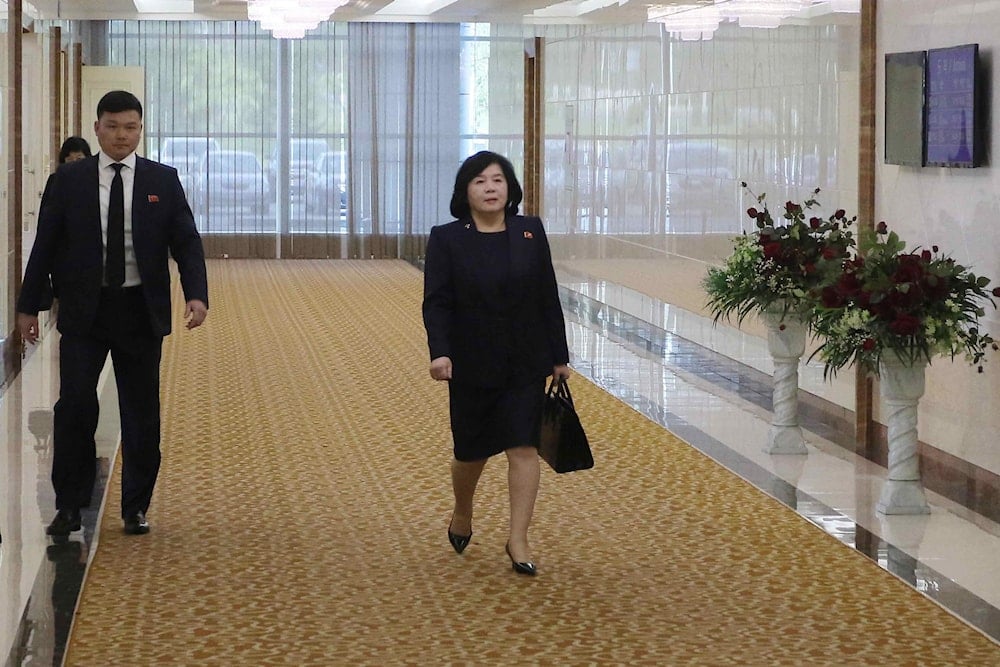DPRK’s Chief Diplomat to visit Russia, Belarus before APEC
The DPRK’s top diplomat plans visits to Russia and Belarus amid renewed talks of a Trump-Kim summit and deepening ties between Pyongyang and Moscow.
-

DPRK Foreign Minister Choe Son Hui, center, walks at the Pyongyang International Airport on her departure for China, in Pyongyang, Saturday, Sept. 27, 2025. (AP)
The DPRK’s Foreign Minister Choe Son Hui is set to travel to Russia and Belarus, state media announced Sunday, though no specific dates for the visit were provided.
According to the Korean Central News Agency (KCNA), Choe “will visit the Russian Federation and the Republic of Belarus at the invitation of the foreign ministries of Russia and Belarus.”
The announcement comes just days before US President Donald Trump’s scheduled trip to South Korea on Wednesday for the Asia-Pacific Economic Cooperation (APEC) Forum.
US media outlets have reported that officials within Trump’s administration have quietly discussed the possibility of arranging another meeting between Trump and DPRK leader Kim Jong Un, their last talks took place in 2019.
Trump has publicly expressed optimism about a potential new summit, saying he hopes to meet Kim again “possibly this year.”
Kim recently held talks with Russian President Vladimir Putin and Belarusian President Alexander Lukashenko in Beijing in September, on the sidelines of a military parade commemorating Japan’s World War II surrender.
DPRK pledges full support for Russia’s sovereignty and security
Earlier this month, DPRK Defense Minister No Kwang Chol declared that Pyongyang will fully support Russia, praising Moscow’s defense of sovereignty, territorial integrity, and national interests.
"Under the strategic leadership of the leaders of Korea and Russia, today, the relations between our two countries are developing in a comprehensive and purposeful cooperation for the future. We will fully support the struggle of the government, the military and the people of Russia, who, under the leadership of the country's president, Comrade Putin, reliably defend the right to sovereignty, territorial integrity and interests of the country," No Kwang Chol said, as quoted by the Russian Defense Ministry.
At the time, Belousov hailed the participation of DPRK troops in the liberation of Russia’s Kursk Region as proof of the “comprehensive strategic alliance” between Moscow and Pyongyang.
Belousov, alongside his DPRK counterpart No Gwang Chol, unveiled the sculpture “Allies. Fighters of Korea” honoring Korean partisans of World War II.
He said the monument pays tribute to past generations while underscoring the current military cooperation between the two nations.
The commemoration was seen as a symbol of historic solidarity between the two nations.
A new multipolar order
China, Russia, and the DPRK are tightening their strategic partnership amid rising tensions with the West. The three nations are aligning across diplomatic, military, and economic fronts, presenting themselves as a united bloc pushing back against US and allied influence.
Moscow and Pyongyang have intensified high-level exchanges, with joint commemorations of historic Soviet-Korean alliances highlighting the depth of their ties. At the same time, Beijing continues to serve as the primary economic partner for both Moscow and Pyongyang, expanding trade, energy cooperation, and infrastructure links despite sanctions pressure.
Military cooperation is also deepening, with Russia and China conducting joint exercises and enhancing security dialogues. While China’s engagement with the DPRK is more restrained, its close partnership with Moscow indirectly strengthens Pyongyang’s position.
Analysts view the alignment as part of a broader shift toward a multipolar order, with Beijing, Moscow, and Pyongyang united by common adversities and strategic interests.
More recently, Iran has become a more prominent ally, particularly by increasingly cooperating with Moscow and Beijing, sparking concerns of a growing CRINK alliance.
Read more: The emerging CRINK alliance: A new challenge to US influence

 4 Min Read
4 Min Read










